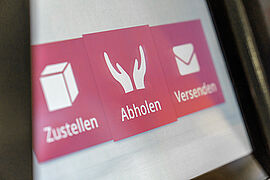Business model and service potential for flexible goods and information flows in the parcel segment
The project aims at the experimental development and piloting of locker systems independent of parcel service providers (reception and dispatch systems for e.g. parcels) in combination with tailor-made service offers in the demo sites in Kaumberg (Lower Austria) and Margareten (Vienna). The main focus is on the usability check (or acceptance test) of the already existing hardware and software solution, which offers added value for recipients, logistics service providers and communities on an economic, ecological and social level. Thus, innovative (local) supply structures (i.e. locker systems) can be used to optimize delivery activities, save time and travel costs as well as CO2 emissions on the supply and demand side and make settlements and cities sustainable. Throughout the entire project, special attention will be paid to the consideration of interests and needs of the involved actors (such as recipients, municipal decision-makers, local economy, parcel service providers) and to the development of spatially scalable results.
The rapidly growing online trade in its complexity requires innovative solutions to ensure the most resource-saving spatial quality of supply in urban and rural areas. Therefore, the alBOX project aims at an economically, ecologically and socially sustainable distribution or "pick-up" of goods and services that best meets the needs of users, parcel service providers and communities. By taking into account areas with different settlement structures, a comprehensive transferability of the results should be guaranteed.
The project follows the idea of linking provider-independent ("white label") locker systems (reception and dispatch systems for e.g. parcels in the B2C, B2B and C2C areas) with local service offers. Based on preliminary studies and the use of already existing data and software technical solutions, the potential of the locker systems will be tested in the course of an operative pilot in the demo sites Kaumberg (Lower Austria) and Margareten (Vienna). The focus is on the usability check (acceptance study) of involved actors (such as recipients, municipal decision makers, local economy, parcel service providers), who will be involved in the project work through a continuous dialogue process. A significant added value results from the generation of (1) quantitative (e.g. size of shipments, frequency of orders, typification of ordered goods, usage times and courses) and (2) qualitative data (e.g. user experience, usability). The acquired data enable the provision of tailor-made services and a nationwide applicable redesign of goods and information flows. The bundling of goods enables an economical operation and the generation of positive social effects (e.g. accessibility for users with special needs) and ecological effects (e.g. reduction of traffic-related negative environmental impacts such as CO2). In particular, real data will be used to investigate whether and to what extent parcel walls have an impact on traffic and especially on CO2. This makes it possible for the first time to evaluate the actual positive or negative impact of such white label logistics concepts.
On the demand side, demand situations and potentials are revealed (acceptance and use) and on the supply side suitable business models are developed and associated services are redefined. The generalizability and scalability of the qualitative and quantitative data obtained will enable the development of scenarios for the future profitable operation of 24/7 accessible, open locker systems throughout Austria.
The necessary expertise is provided by an interdisciplinary consortium consisting of the AIT Austrian Institute of Technology GmbH, the Vienna University of Technology, the FH des bfi Vienna, Storebox Holding GmbH and Variocube GmbH.
This project is funded by the Climate and Energy Fund and is carried out within the framework of the programme "Smart Cities Demo - Living Urban Innovation".




